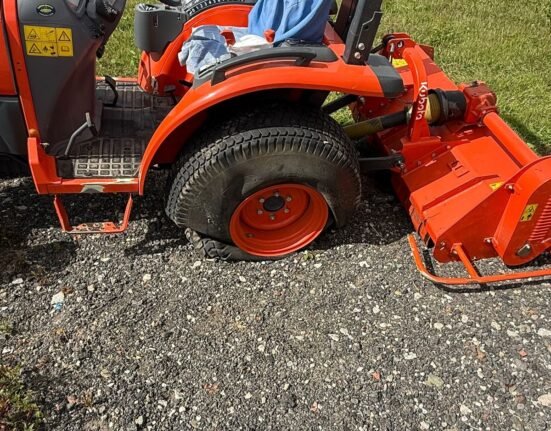Beacon Farms, the charitable agricultural outfit that gives people recovering from drug and alcohol addiction a second chance at life, now is giving local farms a second chance also, by converting rocky land into fertile fields.
A new leg of the charity, known as Beacon Farming Services, is hiring out its massive rock crusher and has already turned 70 acres belonging to five local landowners in George Town and East End into arable soil.
The new agricultural land will be used for a variety of purposes, from livestock grazing to growing hay.
The rock crushing is a tried-and-tested approach, which has been used on six acres of Beacon Farms’ own 34-acre property in North Side, which once had rock-strewn, poor-quality soil that now is used to grow fruits and vegetables commercially.

“Our team provides machinery, labour and expertise for land improvements,” said the farm’s CEO Sandy Urquhart.
“We can consult on agricultural and scientific factors from the best pH of the soil to what crops to grow. At Beacon Farms, we have seen first-hand how the right soil improves crop yield, both in volume and quantity, and are keen to share these benefits with the wider farming community.”
A heavy-duty grinder, pulled by a massive tractor, is used to pulverise the earth, rocks and stones on the land into fine soil, which is then covered in compost, that can be used to grow all kinds of produce.
The machinery, purchased with a donation from the non-profit farm’s founding benefactors, the Haugh Family Foundation, transforms previously unfarmable land into workable fields.
Previously, the equipment was just used on the land at Beacon Farms, but it’s now being offered to third-party landowners who want to improve their land for agricultural purposes, Urquhart said.
For example, the Beacon Farming Services team, led by farm supervisor Anthony Cohen, has been working on property owned by A. L. Thompson in East End, improving the land for grazing his herd of cattle.

“Cayman’s food security can be improved not only by growing more produce but also by raising cattle and other animals,” Thompson said in a press release.
“Reducing costs is critical for farming to be sustainable, so being able to grow food for the animals on site and use locally produced compost instead of imported fertilizers, as Beacon Farms is doing, has both economic and environmental benefits.”
Cohen and his team have also worked on a farm north of Bodden Town owned by Steve Hawley.
Hawley told the Compass the pulveriser had been used on his farm to convert several acres, saying, “It does a fantastic job.”
He added, “Even the worst land we have on Cayman — cliff that’s solid coral — can be repurposed as pasture or farmland. Some of my land was the latter and is now a plowable field and is being planted out with table vegetables now.”
He said some of the land had been crushed into 15-foot-wide strips with 11-foot strips of untreated land in between.
“This allowed me to plant an orchard with all the trees in rows and truck access in the strips in between. The orchard is fully planted and thriving. Planting an orchard in rows has never been possible on Cayman before. Beacon’s pulveriser will change the way farming is done in Cayman,” he said.
The Beacon Farms team also converted land owned by Mary Alberga of the Equestrian Centre in George Town, where she is now growing hay to feed her horses. They created a field at the back of the property to plant grass that can be dried into hay, reducing reliance on imports and their carbon footprint.
A small, private farm holding in North Side was also transformed last year by the team and work is currently under way at a larger farm in East End, according to Beacon Farms.
The non-profit is aiming to become financially self-sufficient through sales of its fresh produce, as well as products manufactured in its small agricultural processing unit, and now, through hiring out its rock-crushing machinery. For the moment though, it is still dependent on charitable funds and government grants.

Urquhart told the Compass that “agricultural literacy” was vital to sustainability and food security in Cayman, where more arable land is now becoming available and there is more interest locally in agriculture.
“We’re getting young farmers who are educated, who are coming to the farm to ask questions about what we spray with, how we deal with growing tomatoes, all sorts of questions. It’s really an exciting period for the country,” he said.
“There’s so much of a groundswell, as people are beginning to think we do need to think very seriously about food security.”
Cayman imports more than 90% of its food, with 80% coming from a single market — the United States. This leaves Cayman in a potentially precarious position if access to overseas produce is threatened, either through weather events, economic or political crises, or disasters, meaning growing our own food on island is becoming more important than ever.

Farm worked by people in recovery
The workers at Beacon Farms are not your typical farm labourers. All are recovering from alcohol or drug abuse, and are people who, Uruquart said, would be considered in different circumstances as “unemployable”. Instead, some have become managers capable of not just running the farm but running a business through their time at the property.
Working “close to the soil” has been therapeutic for them, he said, but they have also found a home in the farm, working with colleagues who are going through the same challenges as them.
And now, some are working to create viable farmland for other farmers as part of the latest leg of the project, which is also proving beneficial to the community — turning Cayman’s less-than-arable land into fields ready for crops.
“By taking a machine and crushing the rock in a field that was already an agricultural field for 300 years, and turning the rock to dust and applying compost to it, allows you to do what you can do in any sophisticated farm in the world,” he said.
Rather than long furrowed rows of crops, as seen in many countries, in Cayman, many farmers use what is known as ‘spot planting’ — sowing seeds in the disparate patches of land that are arable.
“That’s fundamentally changing now,” Urquhart said.
Beacon Farming Services not only crushes the rock and provides compost for the farmers’ land, it can also analyse the soil to determine the best types of crops for it and what nutrients are needed, as well as plant the land using the other mechanised machinery from its own farm.
For more information on land improvement services, contact Beacon Farms at [email protected].







